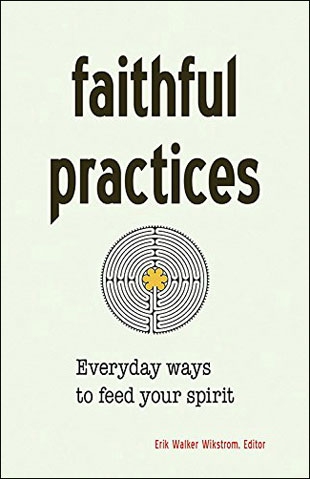"To this day, my personal practice keeps evolving. I've kept my bedtime prayers, but I find that prayer has begun leaking into the rest of my day. On crowded subway cars or in checkout lines, I offer metta to the people around me, discovering that this practice helps my heart to open and my impatience to subside. As I drive through the crowded city streets, on the lookout for distracted pedestrians crossing against the light, I use a shorthand version of metta, simply saying under my breath, 'Blessings' as I looked at each person. For me, blessings means, 'I wish you every good thing.' Again, this simple practice softens my heart and shifts my annoyance. For distracted or aggressive drivers, I pray, 'May you be safe. May your driving not harm anyone.'
"On my drive to the hospital where I work, prayer helps to prepare me for my day. I ground myself with gratitude and perhaps a chant of praise as I marvel at the beauty of the trees, the grasses, the sky. I set my intention for the day as I speak my chaplain prayer aloud: 'May I be what's needed. May I be of service. May I be a blessing.' I ask blessings for the patients, the visitors, and the staff, knowing how challenging each of those roles can be. I extend metta to a coworker whom I find particularly challenging. I've learned that forcing myself to wish her well softens my heart and renders me less reactionary.
"As a final preparation, in ancient Jewish tradition, I invoke for angels who each symbolizes particular qualities: Michael at my right (reminding me that spirit is with me, that I do not do this work alone); Gabriel at my left (representing strength, courage, and healthy boundaries); Uriel in front of me (symbolizing a beacon of light, guiding me); and Raphael behind me (embodying healing and compassion). Imagining these holy beings surrounding me as I do the profound, sacred, and unpredictable work of hospital chaplaincy helps keep me grounded, humbled, courageous, and open.
"Before significant meetings — at work, at church, or otherwise — I take a few deep breaths and pray for compassionate listening, for speaking our truths from a place of love. My favorite prayer is simple: 'May we each see what we need to see, hear what we need to hear, say what we need to say, and do what we need to do. May we be guided toward whatever serves the greater good.' There is no magic here, no supernatural hocus-pocus. Rather, the simple act of praying grounds me, reminding me of my deepest values and highest aspirations, loosening my grip on outcomes and opening me to possibility.
"This is my prayer practice today. I fully expect that it will continue to evolve. By the time this essay is published, it may have shifted again. This kind of continual unfolding is one of the gifts and challenges of Unitarian Universalism. The challenge is that Unitarian Universalism offers no one right way of doing things — no requisite words to say or gestures to learn. The gift is the space for each of us to experiment, personalize, and find our own way, which can lead to spiritual practices that are vibrant and flexible."
